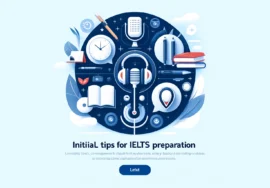
Don’t Get Tricked! Avoid These Common IELTS Listening Traps
Discover essential strategies for avoiding common traps in the IELTS Listening test. Learn how to handle distractors, paraphrasing, and changes in information to boost your score. Get expert tips on active listening, anticipating changes, and practicing with authentic materials to maximize your chances of success on the IELTS Listening section.
Don’t Get Tricked! Avoid These Common IELTS Listening Traps
The IELTS Listening test can be a tricky beast. It’s not just about understanding English; it’s about understanding English spoken with a variety of accents, at a natural pace, and with some sneaky traps designed to catch you out! Think of it as a game – the examiners are trying to trick you, but with the right strategies, you can outsmart them and boost your score.
Unmasking the Tricks: Common IELTS Listening Traps

• Distractors: These are like those annoying multiple-choice options that sound almost right but aren’t. For example, the speaker might say “the meeting is on the 15th,” but the answer choices include both “15th” and “50th.” Listen carefully! These small distractions are designed to throw you off, so be extra vigilant when numbers and dates are mentioned.
• Paraphrasing: The examiners love to paraphrase, meaning they might say the same thing as the question but in different words. For example, the question might ask about “transportation,” but the speaker talks about “getting around.” Be ready for synonyms and antonyms! Understanding a range of vocabulary is key to identifying the correct answer, so don’t just rely on familiar phrases.
• Changes in Information: Sometimes the speaker will change their mind or correct themselves. Pay close attention to any updates or changes in information. Don’t get caught out by the first thing you hear! These corrections often seem like they would be irrelevant, but they are the real answer, so be cautious when the speaker restates something.
• Specific Details: Numbers, dates, and names are often used in traps. Make sure you’re writing down the correct information and double-check your spelling. Even a small error in spelling or a misheard number can lead you to an incorrect answer, so precision is key.
• Sequences and Instructions: The speaker might give a set of instructions or describe a sequence of events. Listen carefully and don’t assume you know what’s coming next. These kinds of questions may require you to pay attention to specific words that signal the order of actions, so take note of sequencing words like “first,” “next,” and “finally.”
• Unexpected Pauses and Repetitions: In the listening test, some speakers will pause for effect or repeat a point for clarity. These repetitions can be confusing if you don’t recognize them, so make sure you pay attention to the context to understand why something is being repeated. Often, the second mention of an idea or fact contains the right answer.
Sharpening Your Skills: How to Avoid the Traps

• Listen Actively: Don’t just let the words wash over you. Concentrate on what the speaker is saying and try to anticipate what might come next. This mental preparation helps you react faster when unexpected changes or traps occur. Focus on understanding the main ideas, not just individual words.
• Anticipate Changes: Be prepared for the speaker to change their mind or correct themselves. Don’t jump to conclusions! Stay flexible and be ready to adjust your answer when new information is provided.
• Focus on Keywords: Identify the key words in the questions and listen for them (or their synonyms) in the audio. This will help you filter out irrelevant information. Knowing which words are most important can guide your attention and prevent you from getting sidetracked by unrelated details.
• Take Notes Efficiently: Good note-taking is essential in the listening test. Practice writing down important details quickly and clearly. This way, you can refer to your notes during the listening and avoid relying entirely on memory.
Practice Makes Perfect: Honing Your Listening Instincts

• Practice with Authentic Materials: Listen to podcasts, news broadcasts, and lectures to get used to natural speech patterns and different accents. The IELTS listening test can include a range of accents, including British, Australian, American, and more, so diversifying your listening practice is crucial.
• Know Your Weaknesses: Analyze your mistakes in practice tests to identify which types of traps you’re most vulnerable to. Whether it’s confusing similar-sounding words, missing a key detail, or falling for a distractor, identifying your weak spots helps you focus your practice and improve faster.
• Simulate Test Conditions: Practice under timed conditions that mimic the actual IELTS listening test. This helps you get used to the pressure of completing the test within the time limit and prevents you from getting flustered during the real exam.
• Review and Learn from Mistakes: After completing practice tests, spend time reviewing your incorrect answers. Understand why you made the mistake, whether it was due to a distractor, paraphrasing, or a lapse in focus. This reflection can prevent future errors.
Mastering Different Accents in IELTS Listening
One of the most challenging aspects of the IELTS Listening test is understanding the variety of accents spoken by the examiners. Whether it’s British, Australian, American, or even a regional accent from within those countries, each accent can throw a wrench in your understanding if you’re not prepared.
• Familiarize Yourself with Accents: While British accents are commonly used in the test, be ready to hear other English-speaking accents. Listening to a wide range of materials such as podcasts, radio shows, and YouTube videos in different accents can help you become more accustomed to various pronunciations and speech patterns.
• Context is Key: Sometimes, the accent itself might not be as important as understanding the context in which the speaker is talking. Pay attention to clues in the environment or the situation being described, as these can help you determine the meaning even if you’re struggling with the accent.
• Listen to a Variety of Speeches: Engage with materials like TED Talks, interviews, or documentaries from different regions. These resources often feature speakers with varied accents and speaking speeds, giving you practice in recognizing the nuances of pronunciation and phrasing.
Time Management Strategies for the IELTS Listening Test
Time management is critical during the IELTS Listening test, where you’ll have to listen, process information, and answer questions within a short period. Developing time management skills can make the difference between a good score and a great one.
• Don’t Rush: While time is tight, rushing through the questions may lead to careless mistakes. Read through the questions before the audio begins, and get familiar with the types of information you’re looking for.
• Pacing Yourself: Each listening section has a set number of questions, so pace yourself accordingly. If you’re spending too much time on one question, move on and come back to it later. Remember, some questions might be trickier than others, so give yourself enough time to answer confidently.
• Stay Calm and Focused: It’s easy to get overwhelmed when the clock is ticking down. Practice keeping your composure during mock tests, and remember that staying calm will help you focus better on the task at hand.
Understanding Question Types in IELTS Listening
The IELTS Listening test involves different types of questions, such as multiple choice, short answer, matching, and more. Knowing the format of each question type can help you approach them strategically.
• Multiple Choice: In these questions, you’ll be given several possible answers. Be sure to listen for key details that differentiate the answers. Distractors are common here, so eliminate the clearly wrong options before focusing on the remaining choices.
• Short Answer: These questions require you to listen for a specific piece of information and write it down. Be mindful of word limits (e.g., “no more than two words”) and make sure your answer fits the required format.
• Matching: In matching questions, you’ll match information from the audio to a list of options. Focus on keywords, and pay attention to the order in which the information is provided, as the sequence may be important.
• Sentence Completion: These require you to fill in missing words from a sentence. Practice identifying where key information will appear in the audio to ensure you can fill in the gaps correctly.
How to Handle Distractions During the IELTS Listening Test
Sometimes, external factors such as noisy surroundings or internal distractions like nervousness can interfere with your focus during the IELTS Listening test. Here’s how to handle such distractions:
• Practice with Distractions: To prepare, simulate test conditions by practicing in noisy environments. This will help you stay focused even when there’s background noise during the actual test.
• Stay Focused on the Audio: If something distracts you during the test, quickly refocus on the audio. Take a deep breath and remind yourself that you can still catch up and answer the remaining questions correctly.
• Mental Resilience: If you miss a question or feel you lost track, don’t dwell on it. Move forward and continue listening for the next answers. A positive mindset can help you recover from small distractions.
Maximizing Your Listening Practice with Technology
Using technology can help enhance your IELTS Listening practice, giving you access to a wide range of materials and personalized feedback.
• Listening Apps: There are various apps available that can help you practice listening. Apps like IELTS Prep, ELSA Speak, or Listenwise provide exercises that help you work on specific skills, such as understanding different accents or identifying key information.
• Online Listening Resources: Websites like BBC, TED, and NPR offer free audio content that can help you practice listening to different speech patterns and topics. Make sure to vary your practice materials to cover a wide range of topics.
• Listening to Audiobooks: Listening to audiobooks, especially ones with complex language and varying speeds, can improve your ability to follow along with spoken English. Try listening to books that come with transcripts, so you can check your understanding afterward.
Conclusion: Stay Alert, Practice, and Excel!
The IELTS Listening test may seem challenging at first, but with the right strategies and consistent practice, it’s entirely manageable. Understanding common traps, sharpening your listening skills, and managing your time effectively will give you a competitive edge. Remember, the key to success is not just hearing the words, but also actively engaging with the content, anticipating changes, and focusing on crucial details. By mastering various accents, familiarizing yourself with question types, and using technology to enhance your practice, you can approach the test with confidence.
Stay vigilant, remain calm under pressure, and don’t let distractions throw you off course. With the proper preparation and mindset, you’re not just aiming to pass the test—you’re setting yourself up to achieve your desired score and move closer to your academic and career goals. Keep practicing, and soon, you’ll be ready to conquer the IELTS Listening test with ease!








